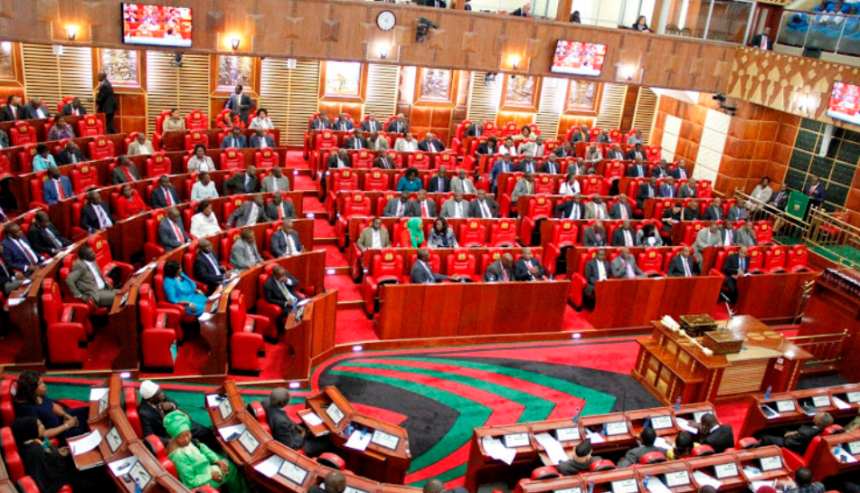National Assembly Speaker Moses Wetangula on Thursday referred President William Ruto’s Memorandum of Referral, in regards to the Finance Bill 2024/25, to Parliament’s Departmental Committee on Finance and Planning, officially kick-starting the process to have the controversial bill withdrawn as per the President’s recommendations.
With Parliament currently on recess until Tuesday, July 23, 2024, questions have been raised concerning how the House will proceed in regards to the retraction of the aforementioned bill.
Wetangula has since come out to clarify that the House will not immediately be reconvened to discuss President Ruto’s memorandum further explaining the basic applicable procedures and implications of the Rejection of the Finance Bill, 2024 on the fiscal year 2024/25
What is the procedure for consideration of the President’s Memorandum to a Bill?
Article 115 of the Constitution empowers the President to refer back a Bill to Parliament for reconsideration, noting any reservations that the President may have concerning the Bill.
Thereafter Parliament is required to consider the reservations in the manner provided for under Article 115 of the Constitution.
What has the President’s Memorandum recommended to the National Assembly in respect of the Finance Bill, 2024?
The President’s Memorandum has referred the Finance Bill, 2024, back to the House for reconsideration with reservations recommending the deletion of all sixty-nine (69) clauses of the bill.
What is the effect of the President’s Memorandum on the Bill and can the Bill be revived?
The President’s Memorandum constitutes a rejection of the bill in its entirety. The effect is that the entire Bill will be lost upon approval of the President’s reservations and recommendations by the National Assembly.
Any Member intending to negate the President’s reservations/veto or revive any of the sixty-nine (69) Clauses of the Bill is required to marshal the votes of at least two-thirds of the Members of the National Assembly, being 233 Members. This is in keeping with the provisions of Article 115(4)(a) of the Constitution.
What is the next course of action?
Upon receipt of the President’s Memorandum, the Speaker of the National Assembly is required to refer the Memorandum to the Departmental Committee on Finance and National Planning.
The Memorandum has since been referred by the Speaker to the Committee for consideration and reporting to the National Assembly when it next sits.
In the event the Committee fails to report to the House at its next sitting, the House shall proceed and consider the Memorandum at Committee of the Whole House upon resumption from recess.
What should guide the Committee and the House in considering the President’s Memorandum?
The President’s Memorandum recommending deletion of all clauses of the Bill, notes that it is informed by the need to reflect the voice of the people of Kenya who have rejected the bill in its entirety. The Committee and the House shall take this justification into account in their deliberations.
What is the link between the Budget, the Finance Bill and the Appropriation Bill?
The Budget for any financial year comprises Estimates of Expenditure for the national government. The approved Estimates of Expenditure are translated into an Appropriation Bill for consideration and passage by the National Assembly.
Documents supporting the Budget contain also projections of revenue, loans, and grants required to finance the Budget for a Financial Year.
The projections of revenue are derived from existing tax measures and proposed revenue-raising measures through new or additional taxation.
Any new or additional taxation measures and any variation to existing tax measures are introduced through a Finance Bill.
The Finance Bill is a piece of legislation that largely consolidates the various proposed taxation measures intended to raise additional revenue to support the budget.
It may lead to an increase or reduction of taxes. The various revenue-raising measures in a Finance Bill are costed and therefore constitute part of the Estimates of Revenue.
Will the National Assembly be recalled to consider the President’s Memorandum?
Standing Order 42(3) of the National Assembly Standing Orders requires the Speaker to transmit to every Member any Message received from the President at a time when the House is not in session and to report the Message to the House on the day it next sits.
Additionally, the National Assembly altered its Calendar and proceeded for a short recess on Wednesday, June 26, 2024.
The House is scheduled to resume its regular sittings on Tuesday, July 23, 2024. The Departmental Committee on Finance and National Planning shall be required to report to the House on the President’s Memorandum on this day.
Can the Finance Bill, 2024 become law by effluxion of time?
Emphatically, No!
Having been referred back to the National Assembly for reconsideration on account of the President’s reservations, the Finance Bill, 2024 cannot become law through mere lapse of time.
What are the implications of the Rejection and Loss of the entire Finance Bill, 2024?
The House is guided that the rejection and loss of the entire Finance Bill, 2024 shall occasion a financing gap of approximately Ksh.300 billion between the expenditure approved by the National Assembly through the Appropriation Bill, 2024 and the projected revenues that may be raised from the existing tax measures.
The next Financial Year shall commence in the next four days, being 1st July 2024. The instrument which authorizes the withdrawal of monies from the Consolidated Fund for utilization by the national government is the Appropriation Bill, which is distinct from the Finance Bill.
Notably, the House has already passed the Appropriation Bill, 2024. The House is guided that the financing gap may be bridged by the reduction of approved expenditure.
This may be achieved by enacting a Supplementary Appropriation Bill in accordance with the applicable procedure.



